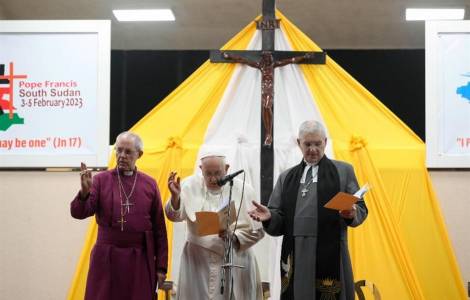
Juba (Agenzia Fides) - "Fundamental decisions on war or peace are now in the hands of the South Sudanese", says to Fides Herena Balatti, Comboni missionary in Malakal, the day after the apostolic visit of Pope Francis in South Sudan.
"Pope Francis, Archbishop of Canterbury Justin Welby and the Moderator of the General Assembly of the Church of Scotland Iain Greenshields asserted in every way and on every occasion
that it is up to the South Sudanese and in particular the political leaders to decide whether to continue on the path of violence or to embark on the path of peace," the missionary stresses.
The signs that came shortly before the visit of the three religious leaders were not encouraging. "Two days before their visit," Sister Elena recalls, "27 people were massacred in Kajo-Keji in Central Equatoria State, south of the Federal capital Juba. A massacre denounced by the local Anglican bishop and then re-launched by the Archbishop of Canterbury Welby on his social channels. The three religious leaders reminded local politicians of this episode and urged them to work concretely to reach peace agreements."
Sister Elena also recalls that "in the diocese of Malakal, which covers about one-third of the country's territory, UN organizations and some foreign embassies had issued an alert two days before the apostolic visit about the preparation of a violent clash between well-armed groups in Upper Nile State". "The warning and the coincidental visit probably prevented the clash but at the moment the opposing groups are still on the ground facing each other, ready to fight," says Sister Elena.
Despite the peace agreements signed in 2018 in South Sudan, there are still some armed groups that have not joined, resulting in the persistence of areas of deep instability. The division of the population into 64 ethnic groups is said to be the cause of the civil war. "Yes the ethnic factor serves unscrupulous politicians as a mobilizing factor, to recruit people willing to fight for them," says Sister Elena. "But it is the power-sharing struggles that are the main cause of instability in South Sudan. Moreover, the situation in South Sudan is becoming more and more similar to that in the east of the Democratic Republic of Congo. Internal power struggles are superimposed by external interests aimed at seizing the resources of South Sudan: gold, oil, natural gas and the vast fertile lands that are coveted by several non-African states".
Sister Elena, who accompanied some 50 displaced people from Malakal to Juba for the meeting with Pope Francis, concludes by stressing that "the example set by the visit of the three Christian religious leaders must stimulate us. We have been invited to hope and to work together to build a better future". (L.M.) (Agenzia Fides, 7/2/2023)